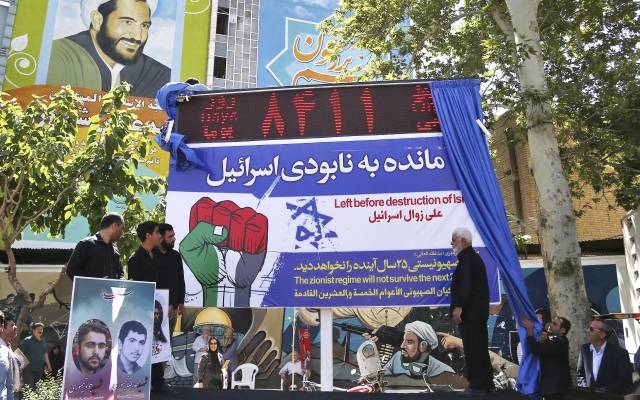It’s time for a modicum of research before the New York Times again repeats the “occupation” myth.
By Jerold Auerbach, The Algemeiner
Last month, in one of his debut articles as New York Times Jerusalem Bureau Chief, Patrick Kingsley focused on Israel’s distribution of coronavirus vaccines.
But his seemingly obsessive repetition of references to Israel’s “occupied territories” made me wonder whether the Times holds anti-Israel indoctrination sessions for reporters who cover the Jewish state.
I was, however, prepared to make an allowance for a Times newcomer who might not yet have been indoctrinated into his newspaper’s politically correct reporting guidelines.
But Kingsley seems to be a fast learner. Writing (March 6) about a talented Palestinian woman who has become “a rising star of global electronic music,” he noted her popularity in Ramallah, “the hub of the occupied West Bank.”
Several paragraphs further along he referred to the Palestinian Authority as “the body that oversees parts of the occupied territories.”
As in his previous article, where his only cited authority for the “Israeli occupation” was the director of a Palestinian advocacy group, Kingsley closed by quoting Ms. Abdulhadi who, lamenting that “the occupation disconnected us from each other,” expressed the hope that her music will encourage togetherness.
For decades as a Wellesley College professor I taught a course on the history of Israel. That history, which began in 1948 with its Proclamation of Independence, had its modern grounding in the Balfour Declaration (1917).
In his famous letter to Lord Walter Rothschild, British foreign secretary Arthur James Balfour conveyed the memorable statement on behalf of His Majesty’s Government that it “view[s] with favor the establishment in Palestine of a national home for the Jewish people.”
But where was “Palestine”? It was defined by the League of Nations Mandate as the territory between the Jordan River and the Mediterranean Sea. Land east of the river was ceded to Abdullah I by Colonial Secretary Winston Churchill for what became the Kingdom of Jordan.
But in 1948, following the Arab war to annihilate the fledgling Jewish State of Israel, Jordan’s conquest west of the Jordan River became known as its “West Bank.”
That land, as it happened, comprised the ancient Kingdom of Israel: Samaria to the north and Judea to the south. It included Shechem, the first capital of the Kingdom of Israel, mentioned in the Hebrew Bible (Genesis 12:6-7) as the site of the altar built by Abraham “to the Lord who had appeared to him … and had given that land to his descendants.”
It became the first capital of ancient Israel. Hebron is where Abraham purchased the first parcel of land in the promised land (to bury Sarah). King David ruled there before relocating his throne to Jerusalem to unify his kingdom.
In 1967, in what became known as the Six-Day War, Israel regained control over its Biblical homeland in Judea and Samaria. The first return of Jews was to Hebron, where the patriarchs and matriarchs of the Jewish people are entombed in the Machpelah shrine.
It is the oldest Jewish site in the oldest Jewish city in the Land of Israel, where Jews lived and prayed millennia before the appearance of Islam.
Although Hebron Jews, and more than 500,000 other settlers, are routinely vilified — by liberal Jews in Israel and the United States (especially by the New York Times) — as illegal “occupiers” of “Palestinian” land, history suggests otherwise. No land, not even Jerusalem, is as deeply embedded in the Biblical narrative as Hebron.
Hebron Jews comprise a unique community of Jewish memory. Their unrelenting determination to inhabit their ancient city expresses a tenacious insistence on affirming the geographical and spiritual source of Jewish history in the Land of Israel.
Ever since Joseph and his brothers brought their father Jacob from Egypt to be buried in the Machpelah Cave alongside Sarah and Abraham, Jews have always returned to Hebron.
Needless to say, but worth repeating, there is no mention of “Palestinians” in the biblical text. Indeed, even knowledgeable Palestinians have conceded that no distinctive “Palestinian” identity emerged until 1967, following the Six Day-War, when triumphant Israeli soldiers assured the return of Jews to their biblical homeland. Until then they were Arabs.
Patrick Kingsley and the New York Times notwithstanding, biblical Judea and Samaria are not “occupied territory.” It may be time for a modicum of research before his misnomer is yet again — and erroneously — repeated. But beware: by Times standards the United States might yet be accused of “occupying” New Mexico.
Jerold S. Auerbach is the author of twelve books, including Hebron Jews: Memory and Conflict in the Land of Israel and Print to Fit: The New York Times, Zionism and Israel 1896-2016, selected for Mosaic by Ruth Wisse and Martin Kramer as a Best Book for 2019.

HELP ISRAELIS BATTLE CORONA!
Donate to the Corona Emergency Relief Fund. Coronavirus has taken a huge toll on the people of Israel. The poor, elderly and ill are most vulnerable.
Israeli soldiers, security officers and medical care providers operate under great danger and risk to life.
Over 1 million Israelis are out of work. Many cannot make ends meet. We provide financial aid, food, medical supplies and more. Funds are distributed where needed most. The time to act is now!
United with Israel extends a special note of appreciation to the Genesis Prize for their generous support.
Send Passover Packages to Needy Israeli Soldiers - Bring Them Joy!
We are honored to thank the young men and women of the IDF who risk their lives every day to protect the citizens of Israel. Since October 7th, soldiers have been on the battlefield for months - many are hoping to come home for Passover.
Join us in sending Passover food packages (and personal notes) to Israeli soldiers and their families.
Many soldiers spend the Passover holiday with needy families back home. The soldiers greatly appreciate your love and concern. Bring them Passover joy!
CLICK HERE TO SEND YOUR PACKAGE AND NOTE TO ISRAELI SOLDIERS!




